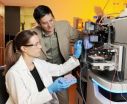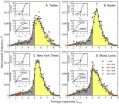Expectant mothers on antidepressants risk newborns with high blood pressure
2012-01-13
(Press-News.org) Mothers who take anti-depressants during pregnancy are more likely to give birth to children with persistent pulmonary hypertension (high blood pressure in the lungs) finds a study published today on bmj.com.
Persistent pulmonary hypertension is an increase in blood pressure in the lungs leading to shortness of breath and difficulty breathing. It is a rare, but severe disease with strong links to heart failure.
The study, carried out by researchers at the Centre for Pharmacoepidemiology at Karolinska Institutet in Stockholm Sweden, reviewed 1.6 million births in total between 1996 and 2007 in five Nordic countries: Denmark, Finland, Iceland, Norway and Sweden. The babies were assessed after 231 days (33 weeks).
A total of 1,618,255 singleton births were included in the study. Approximately 11,000 of the mothers filled out a prescription for anti-depressants in late pregnancy and approximately 17,000 in early pregnancy. Those who did fill out a prescription were generally older mothers who also smoked. A further 54,184 mothers were identified as having previously undergone psychiatric diagnosis but were not currently taking any medication.
Factors taken into account during the study included persistent pulmonary hypertension, maternal smoking, BMI (in early pregnancy), year of birth, gestational age at birth, birth weight and maternal diseases including epilepsy, malignancies, arthritis, bowel disease, lupus and pre-eclampsia.
The uses of several drugs were analysed which included fluoxetine, fluvoxamine, citalopram, paroxetine, sertraline, fluvoxamine and escitalopram. Although, research found that fluvoxamine had rarely been used and that none of the children with persistent pulmonary hypertension were exposed to this drug.
The results found that out of 11,014 mothers who used anti-depressants in late pregnancy just 33 babies (0.2%) were born with persistent pulmonary hypertension and out of 17,053 mothers who used anti-depressant drugs in early pregnancy, just 32 babies (less than 0.2%) were diagnosed with persistent pulmonary hypertension. A total of 114 babies whose mothers had previously been diagnosed with a mental illness were found to be suffering from the disease.
For mothers using anti-depressants, factors such as being born small for gestational age, or by C-section did not influence the likelihood of having a child with persistent pulmonary hypertension.
While the authors acknowledge that the risk of developing pulmonary persistent hypertension is low (around three cases per 1000 women which more than doubles if anti-depressants are taken in late pregnancy) they still advise caution when treating pregnant women with SSRIs.
In an accompanying editorial, researchers from the Motherisk Program Hospital for Sick Children in Toronto and the School of Pharmacy at the University of Oslo support the view that mothers who take SSRIs in late pregnancy are more likely to give birth to children with persistent pulmonary hypertension.
INFORMATION:
Research: Selective serotonin-reuptake inhibitors during pregnancy and risks of persistent pulmonary hypertension of the newborn: population based cohort study from the five Nordic countries.
Editorial: SSRIs and persistent pulmonary hypertension of the newborn
END
ELSE PRESS RELEASES FROM THIS DATE:
2012-01-13
It is time to leave apart the belief that mass media are always a source of bad habits. Television, newspaper and the Internet, when used to get information, may turn out to be of help for health.
It is the conclusion of a study conducted by the Research Laboratories at the Fondazione di Ricerca e Cura "Giovanni Paolo II" in Campobasso which analyzed data from a sample of more than 1,000 people from the largest Moli-sani Project, the epidemiological study that recruited 25,000 subjects in Molise, a southern region of Italy.
The report, published on line in the International ...
2012-01-13
Researchers from the Georgia Institute of Technology and the Centers for Disease Control and Prevention (CDC) have developed a new laboratory test that can rapidly identify the bacterium responsible for staph infections. This new test takes advantage of unique isotopic labeling combined with specific bacteriophage amplification to rapidly identify Staphylococcus aureus.
Quickly and accurately detecting infections caused by S. aureus is critical because the pathogenic bacterium causes a broad spectrum of infections, ranging from acute to chronic disease, which need to ...
2012-01-13
Physicists at Linköping University have shown that a dose of hydrogen or helium can render the "super material" graphene even more useful.
Graphene has engendered high expectations whereof its extreme properties depend on the fact that it consists of a single sheet of carbon atoms. However the attraction forces between the atoms cause the sheets to be drawn to each other. One solution is to add atomic hydrogen between the layers.
Presented in the eminent journal Physical Review A, the researchers' calculations show that the hydrogen at a given concentration affects ...
2012-01-13
Thousands more American senior citizens with kidney disease are good candidates for transplants and could get them if physicians would get past outdated medical biases and put them on transplant waiting lists, according to a new study by Johns Hopkins researchers.
The Hopkins investigators estimate that between 1999 and 2006, roughly 9,000 adults over 65 would have been "excellent" transplant candidates and approximately 40,000 more older adults would have been "good" candidates for new kidneys. None, however, were given the chance.
"Doctors routinely believe and tell ...
2012-01-13
New Orleans, LA – A study led by Russell R. Russo, MD, a third-year Orthopaedic Surgery resident at LSU Health Sciences Center New Orleans School of Medicine, has identified a new source of life-threatening necrotizing fasciitis – "bath salts." The study, describing the first known case of necrotizing fasciitis from an intramuscular injection of the street drug known as "bath salts," is published in the January 2012 issue of Orthopedics, now available online.
Necrotizing fasciitis is an orthopedic emergency. The ability to quickly and accurately diagnose this rapidly ...
2012-01-13
TORONTO, Ont., Jan. 12, 2012—Researchers at St. Michael's Hospital have published the first detailed figures showing the risk of using the prescription drug Rasilez in combination with certain other blood pressure-lowering medications.
The pharmaceutical company Novartis terminated a large, international clinical trial of the drug last month after finding an increased incidence after 18-24 months of non-fatal strokes, renal complications, high levels of potassium in the blood and low blood pressure.
As a result, Health Canada said on Dec. 22 that it would review the ...
2012-01-13
A new study published in the journal Nature Medicine by NYU Cancer Institute researchers, shows how the cancer causing gene Notch, in combination with a mutated Polycomb Repressive Complex 2 (PRC2) protein complex, work together to cause T- cell acute lymphoblastic leukemia (T-ALL).
T-ALL is an aggressive blood cancer, predominately diagnosed in children. It occurs when one lymphoblast, an immature white blood cell, turns malignant, multiplying uncontrollably and spreading rapidly throughout the body. If left untreated, the disease can be fatal in a few weeks. Cancer-causing ...
2012-01-13
WEST LAFAYETTE, Ind. - Honeybee populations have been in serious decline for years, and Purdue University scientists may have identified one of the factors that cause bee deaths around agricultural fields.
Analyses of bees found dead in and around hives from several apiaries over two years in Indiana showed the presence of neonicotinoid insecticides, which are commonly used to coat corn and soybean seeds before planting. The research showed that those insecticides were present at high concentrations in waste talc that is exhausted from farm machinery during planting.
The ...
2012-01-13
"If it bleeds, it leads," goes the cynical saying with television and newspaper editors. In other words, most news is bad news and the worst news gets the big story on the front page.
So one might expect the New York Times to contain, on average, more negative and unhappy types of words — like "war," " funeral," "cancer," "murder" — than positive, happy ones — like "love," "peace" and "hero."
Or take Twitter. A popular image of what people tweet about may contain a lot of complaints about bad days, worse coffee, busted relationships and lousy sitcoms. Again, it might ...
2012-01-13
TAMPA, Fla. (Jan. 12, 2012) – Using two cell surface markers found to be highly expressed in breast cancer lymph node metastases, researchers at Moffitt Cancer Center, working with colleagues at other institutions, have developed targeted, fluorescent molecular imaging probes that can non-invasively detect breast cancer lymph node metastases. The new procedure could spare breast cancer patients invasive and unreliable sentinel lymph node (SLN) biopsies and surgery-associated negative side effects.
Their study was published in a recent issue of Clinical Cancer Research ...
LAST 30 PRESS RELEASES:
[Press-News.org] Expectant mothers on antidepressants risk newborns with high blood pressure

